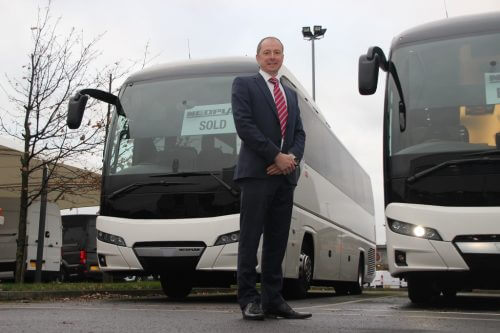 Wayne Ulph, General Manager of Bus & Coach sales at MAN talks to Gareth Evans about the latest developments at the Manchester-based dealership, including new products, used vehicles and his approach
Wayne Ulph, General Manager of Bus & Coach sales at MAN talks to Gareth Evans about the latest developments at the Manchester-based dealership, including new products, used vehicles and his approach
It’s been all change at MAN Bus & Coach’s Trafford dealership in Manchester. In the not too distant past, I recall finding a yard full of used vehicles. However, when I visited the site recently to interview Wayne Ulph, General Manager at MAN Bus & Coach, I was immediately struck by how empty the yard was. In fact, there were only four new coaches out the front and a couple in the workshop.
Wayne knows how to welcome his visitors – he immediately offers a brew, which says a lot about someone in my opinion. He speaks in a frank, non-aggressive, down-to-earth manner which I believe appeals to many operators. Away from the hustle and bustle of the reception, we talked in the dedicated coach and bus suite – surrounded by seat samples, fabrics and memorabilia.
New Tourliner
CBW: The new Tourliner made its UK public debut at the UK Coach Rally in Blackpool. What’s the latest? How did you bring the previous model to a close?
Wayne Ulph (WU): In 2016 we had the European launch of the new Tourliner, only to be told we would not be getting it in the UK until the end of the year. The vehicle displayed at the UK Coach Rally was a prototype – it’s still our current demonstrator. I had a challenge that to fulfil our commitment to the factory, we had to sell 47 of the existing model before we would even see a new Tourliner.
I decided we would no longer offer a two-tier product – a Select or a VIP. Why? Because when I took over the department, I inherited a number of older stock units – and primarily, they were VIP. Customers would openly say they were coming in to buy a VIP and test drive it. While they were here, they would ask to look at a Select. No customer can justify a £30,000 hike in cost, when at the end of the day it’s still a Tourliner. The Select was built to a slightly lower specification, including slightly cheaper seats and no alloy wheels. Are the operator’s customers going to pay extra to sit on a slightly better seat or on a vehicle with alloys? The answer is no of course. Nine times out of 10, operators would choose the Select. It meant I was left with a lot of expensive stock that I had to move on.[…]
By subscribing you will benefit from:
- Operator & Supplier Profiles
- Face-to-Face Interviews
- Lastest News
- Test Drives and Reviews
- Legal Updates
- Route Focus
- Industry Insider Opinions
- Passenger Perspective
- Vehicle Launches
- and much more!


